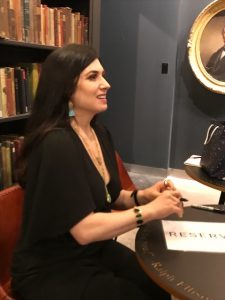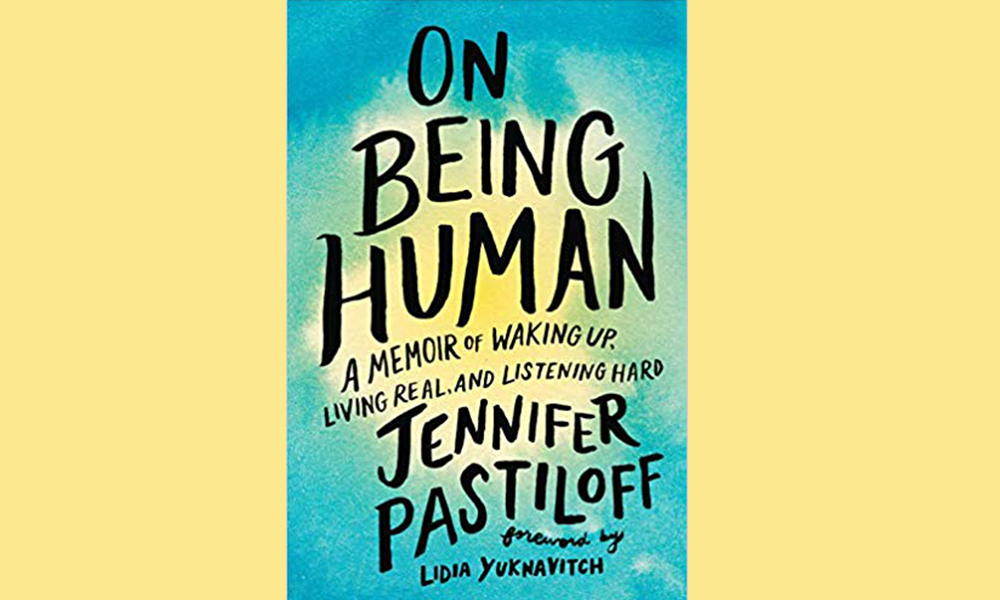For a growing number of fans, Jennifer Pastiloff is a household name. Many are readers of her blog, The Manifest-Station, or have written for it. Some have attended her workshop retreats that combine yoga with writing. Anyone can view the YouTube video where she speaks on what she calls “doing love.” If only it were as easy as it sounds.
Pastiloff’s book, On Being Human: A Memoir of Waking Up, Living Real, and Listening Hard, presents a roadmap for how to “do love,” offering her own journey from self-effacement to self-worth, pulling in the stories about her current successes (and failures) as a yoga facilitator. She draws us in with her raw humor and savvy smarts, creating an intimate persona that embraces both the powerlessness of a child with undetected hearing loss to the wise-cracking hard-earned wisdom of the actualized adult, unafraid to make her disability public. With heartbreaking irony, Pastiloff writes that even as a child she was a connector. In this time of national divisiveness, her penchant for creating connections is perhaps the reason a number of writers and celebrities have singled out Pastiloff’s memoir for its offer of hope, inspiration, and even light.

By strategically placing examples of her inspirational interactions with those even more vulnerable than herself throughout the narrative, she demonstrates how we are in this together, that lifting others up — showing up for others — is among the prime joys in life and, for her, an awakening, a reason for being.
Readers travel with Pastiloff as she retraces a life marked by loss, uprooting and trauma, a life lived with passion, with introversion and self-medication, a life lived hard. Her father’s death sent her into a long, downward spiral. She felt responsible for the death as only an eight-year-old would. She was angry at him for his self-destructive habits (poor nutrition, smoking, drinking, disloyalty to her mother). The difficulties mount further with her interactions with men and the failure of her quest for a career in the arts. Pastiloff’s is more than a poor-girl-makes-good story with a happy ending. Transparent and funny, she answers the question her workshop attendees kept asking her: “How did you go from waitressing for almost two decades to being a guest on Good Morning America?”
It wasn’t simply practice. For thirteen years she waited tables at LA’s The Newsroom Cafe. Her path to becoming a yoga teacher and facilitator with celebrity status was arduous and circuitous, with a creative turnaround that surprised even Pastiloff. She writes, “I used some of my street skills and my instincts to craft something that was outside the box — and make it my own.” She took risks that required trusting self and universe. But then again, a good waitress must be a good listener—and in Pastiloff’s case — a good lip-reader.
And she is still crafting. On Being Human is just another step. Pastiloff might say that she is creating now-whats — her refreshing paraphrase for not resting on one’s laurels. Pastiloff creates a number of similar linguistic distillations — two and three-word catchphrases —to call out patterns of mental self-sabotage; among them, the IA (inner asshole — the self-defeating voice), bullshit story (the lie itself, often told by the IA), now-what (impetus to plot the next success, rather than living in a current state of self-satisfaction), just-a-box (a limiting identity, often connected to a past success or a label supplied by one’s day-gig, for example, as in just-a-waitress or just-a-mother or just-a-student).
This is a story about bodies, mainly female bodies. The vulnerabilities are those of sex and childbirth and disability. Pastiloff’s vulnerability is evidenced everywhere. She is open about her anorexia, about anxiety and depression, about her obsession with having a flat stomach, about being too short, about surprise pregnancies, miscarriage, ambivalence toward motherhood, and about her feminism. Pastiloff takes up the mantle of the everywoman, telling how society’s rules show up in our bodies, how they defile us, haunt us, hound us. She models how we heal ourselves by healing others, by being supportive of other women, by raising our sons to be respectful, by celebrating our bodies, and by gathering. Reach out, she says. Laugh, she says. Show up.
At its core, On Being Human is about radical listening, radical kindness to the self and others, creating self-worth, and sharing — not giving up, not giving in, and being honest. The irony is that Pastiloff has complete hearing loss. She listens by watching. As a child, she endured teachers insisting she “pay attention.” During yoga classes, a teacher made fun of her for not closing her eyes. When she said she needed to use her eyes, he didn’t back down. Even without hearing loss, even without the inequality of the power relationship, standing up for the self is harrowing. It would seem obvious. It should be common sense, but as E. E. Cummings wrote many years ago — long before the internet, before Trump slid into office, before 9/11 — “To be nobody but yourself in a world which is doing its best day and night to make you everybody else means to fight the hardest battle which any human being can fight and never stop fighting.”

But Pastiloff’s memoir does not stop at the self. Her most profound moments of actualization and insight involve others and the shared experience. Her path to fulfillment punctuates and frames her story, showing the power of mindfulness, allowing the memoir to function as a self-help book. It’s a book that offers clues for the reader’s fulfillment too.
Pastiloff does not suggest that the tragedies will go away. She does not say you can stop taking medication for depression. She does not say she will ever get over losing her father at age eight. In fact, she suggests the very opposite: “How everything leads to something else, and if you look for it, traces of people we love, of people long gone, of beauty, are all around us, all the time…Things permeate us. Like smoke, they billow up until we finally notice and swat them away. Only, no matter how hard we think we’re swatting, nothing’s really going anywhere. It’s all right here. That is what I am working on sharing in my workshops: how our stories are within us, and they deserve to be let out, they deserve to be heard.”
While these stories invite us in, while they show just how the individual life told true speaks of universal experiences of grief and frustration, Pastiloff is not prescriptive: “I don’t know why my friend’s baby died or why my dad died so young or why my nephew has the most cruel disorder I can think of or why I can’t hear. There is no why.”
She writes about one of her retreats attended by a woman who had lost a child, and was there on one of her scholarships: “It is an honor to have people attend who have experienced such profound loss and to try and give them a week of uninhibited joy (which often included a lot of tears)…. We bore witness to grief and joy. We saw someone fall in love. We watched people crack open. We got carsick. We drank wine. We had dance parties. We ate so much gelato… Each attendant left with their own personal satchel of love notes, something I do at all my week-long retreats to help us be beauty hunters instead of fault finders. We listened fiercely, like our lives depended on it.”
A few weeks ago, I heard Venus Williams speak to Vanderbilt graduates, and the first of her ten pointers (she went from ten to one) was this: It’s your failures that are your best friends. Your mistakes are what you learn by. And her last pointer: “Help others.” Pastiloff’s story is the embodiment of that advice. The memoir is an invitation to Pastiloff’s house, public access to the private life. And yet there’s a purpose to her text, a strategy: to be conscious. The strategy is: this is what I didn’t know about myself. The strategy is storytelling. Hand in hand with Pastiloff’s vulnerability is her generosity, visible on every page.


